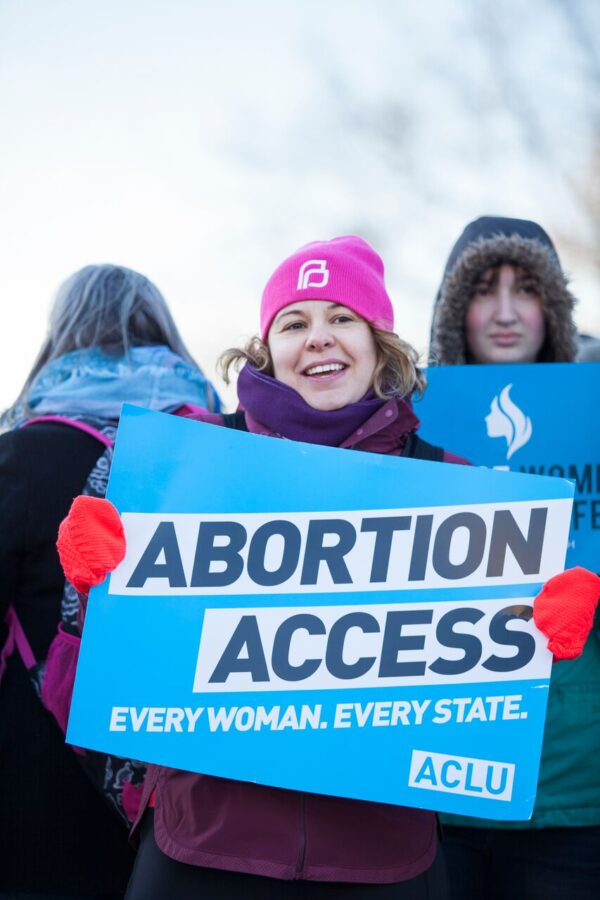Religion and Reproductive Rights
Preterm-Cleveland v. David Yost
On September 2, 2022, the American Civil Liberties Union, the ACLU of Ohio, Planned Parenthood Federation of America, and the law firm WilmerHale filed a lawsuit in the Hamilton County Court of Common Pleas bringing a state constitutional challenge against SB 23, a law banning abortion starting at approximately six weeks of pregnancy. This lawsuit came more than two months after the draconian bill took effect on June 24, 2022 for the first time since it was passed in 2019, causing an immediate, devastating crisis across the state. Due to the ongoing irreparable harm to Ohioans, the reproductive rights organizations withdrew the lawsuit they initially filed in the state Supreme Court in late June and asked the lower court to grant immediate relief blocking the ban.
Status: Ongoing
View Case
Learn About Religion and Reproductive Rights
All Cases
10 Religion and Reproductive Rights Cases

Texas
Sep 2022
Religion and Reproductive Rights
Reproductive Freedom
Franciscan Alliance v. Burwell
The ACLU intervened in a case challenging a section of the Affordable Care Act that prohibits health care entities from discriminating based on race, national origin, sex, age or disability.
Explore case
Texas
Sep 2022

Religion and Reproductive Rights
Reproductive Freedom
Franciscan Alliance v. Burwell
The ACLU intervened in a case challenging a section of the Affordable Care Act that prohibits health care entities from discriminating based on race, national origin, sex, age or disability.

Alabama
Jul 2017
Religion and Reproductive Rights
Reproductive Health Services v. Marshall
On July 28, 2017, the U.S. District Court blocked an Alabama law that imposed severe barriers on a minor’s ability to get abortion care in the state. The law, which was passed in 2014, applied to minors who sought a judicial bypass of the state’s parental consent requirement for abortion. It went beyond any other parental consent law in the country and forced minors seeking abortion care to stand trial if they were unable to obtain a parent’s consent for the procedure.
Explore case
Alabama
Jul 2017

Religion and Reproductive Rights
Reproductive Health Services v. Marshall
On July 28, 2017, the U.S. District Court blocked an Alabama law that imposed severe barriers on a minor’s ability to get abortion care in the state. The law, which was passed in 2014, applied to minors who sought a judicial bypass of the state’s parental consent requirement for abortion. It went beyond any other parental consent law in the country and forced minors seeking abortion care to stand trial if they were unable to obtain a parent’s consent for the procedure.

Alabama
Mar 2016
Religion and Reproductive Rights
Planned Parenthood Southeast, Inc., v. Strange
The American Civil Liberties Union, the ACLU of Alabama, Planned Parenthood Federation of America, and Planned Parenthood Southeast, have filed a lawsuit challenging a state law that places onerous and medically unnecessary restrictions on abortion providers and would force most of the state’s clinics to stop providing abortions.
Explore case
Alabama
Mar 2016

Religion and Reproductive Rights
Planned Parenthood Southeast, Inc., v. Strange
The American Civil Liberties Union, the ACLU of Alabama, Planned Parenthood Federation of America, and Planned Parenthood Southeast, have filed a lawsuit challenging a state law that places onerous and medically unnecessary restrictions on abortion providers and would force most of the state’s clinics to stop providing abortions.

U.S. Supreme Court
Feb 2016
Religion and Reproductive Rights
Zubik v. Burwell
Whether religiously-affiliated nonprofits have a valid religious objection to a rule that allows them to opt out of the requirement to provide contraceptive care coverage for their employees under the Affordable Care Act.
Explore case
U.S. Supreme Court
Feb 2016

Religion and Reproductive Rights
Zubik v. Burwell
Whether religiously-affiliated nonprofits have a valid religious objection to a rule that allows them to opt out of the requirement to provide contraceptive care coverage for their employees under the Affordable Care Act.
